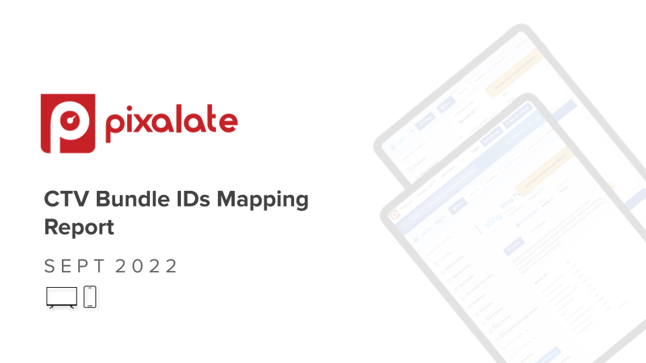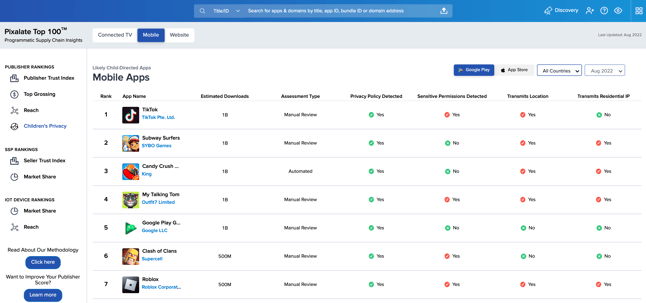
This week's review of ad fraud and privacy in the digital advertising space:
 MediaPost wrote an article about Pixalate’s research on multiple Bundle IDs being used for CTV apps, making accurate targeting, measurement and fraud detection more difficult.
MediaPost wrote an article about Pixalate’s research on multiple Bundle IDs being used for CTV apps, making accurate targeting, measurement and fraud detection more difficult.
The article continues, “That’s according to a new study by CTV and mobile fraud protection, privacy, and compliance analytics platform Pixalate, which is promoting its proprietary mapping solution as a means of tackling the challenge.
Targeting accuracy and measurement for open programmatic on CTV depend on clear identification of the apps on which transactions occur. But unlike App Store IDs generated by the store itself, bundle IDs, which are manually created by CTV platforms, aren’t guaranteed to be unique, explains Pixalate.”

WIRED published an article detailing what California’s new Age-Appropriate Design Code Act (ADCA) might mean for children’s online privacy in the U.S. The ADCA would apply to privacy policies for companies that have users under 18 years of age and implement a high level of privacy for users by default.
WIRED cited Pixalate’s Q2 COPPA Scorecard report saying, “A recent study by software company Pixalate found that thousands of kid-directed apps transmit users’ GPS data and residential IP addresses to ad companies.”
 Pixalate released research on a study of CTV transactions conducted over the last three months (June to August 2022) to provide insights into the scale of variations in CTV Bundle IDs. The full report is available for download here.
Pixalate released research on a study of CTV transactions conducted over the last three months (June to August 2022) to provide insights into the scale of variations in CTV Bundle IDs. The full report is available for download here.
 Pixalate released its Children’s Privacy Index for August 2022, identifying the 100 most popular likely child-directed mobile apps globally across the Google Play and Apple App stores.
Pixalate released its Children’s Privacy Index for August 2022, identifying the 100 most popular likely child-directed mobile apps globally across the Google Play and Apple App stores.
Pixalate’s Children’s Privacy Index is the first publicly available index designed to guard children’s online privacy and encourage compliance with regulations like the Children’s Online Privacy Protection Act (COPPA). The index identifies the most popular likely child-directed apps and provides insight on whether they are transmitting personal information such as geolocation and residential IP with advertisers and/or data brokers.
 TechCrunch detailed a class action lawsuit filed in the Northern District of California against tech giant Oracle “alleges the tech giant’s ‘worldwide surveillance machine’ has amassed detailed dossiers on some five billion people, accusing the company and its adtech and advertising subsidiaries of violating the privacy of the majority of the people on Earth.”
TechCrunch detailed a class action lawsuit filed in the Northern District of California against tech giant Oracle “alleges the tech giant’s ‘worldwide surveillance machine’ has amassed detailed dossiers on some five billion people, accusing the company and its adtech and advertising subsidiaries of violating the privacy of the majority of the people on Earth.”
 The New York Times announced Ireland’s Data Protection Commission will impose one of the steepest fines to date under the General Data Privacy Regulation. Meta’s subsidiary Instagram is accused of making children’s accounts for those aged 13 to 17 years old public by default and allowing underage users with business accounts to make their phone numbers and emails public.
The New York Times announced Ireland’s Data Protection Commission will impose one of the steepest fines to date under the General Data Privacy Regulation. Meta’s subsidiary Instagram is accused of making children’s accounts for those aged 13 to 17 years old public by default and allowing underage users with business accounts to make their phone numbers and emails public.
*By entering your email address and clicking Subscribe, you are agreeing to our Terms of Use and Privacy Policy.
These Stories on Weekly Recaps
*By entering your email address and clicking Subscribe, you are agreeing to our Terms of Use and Privacy Policy.

Disclaimer: The content of this page reflects Pixalate’s opinions with respect to the factors that Pixalate believes can be useful to the digital media industry. Any proprietary data shared is grounded in Pixalate’s proprietary technology and analytics, which Pixalate is continuously evaluating and updating. Any references to outside sources should not be construed as endorsements. Pixalate’s opinions are just that - opinion, not facts or guarantees.
Per the MRC, “'Fraud' is not intended to represent fraud as defined in various laws, statutes and ordinances or as conventionally used in U.S. Court or other legal proceedings, but rather a custom definition strictly for advertising measurement purposes. Also per the MRC, “‘Invalid Traffic’ is defined generally as traffic that does not meet certain ad serving quality or completeness criteria, or otherwise does not represent legitimate ad traffic that should be included in measurement counts. Among the reasons why ad traffic may be deemed invalid is it is a result of non-human traffic (spiders, bots, etc.), or activity designed to produce fraudulent traffic.”

